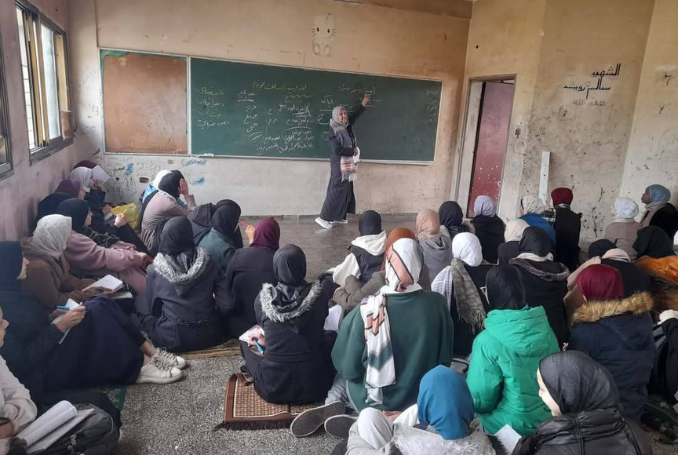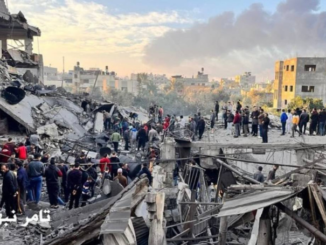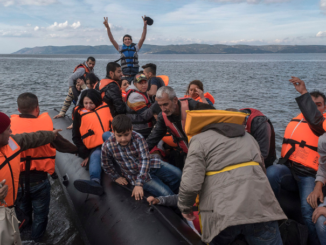
By Raed Musa
For Nour Abu Salah and thousands of others, the dream of higher education in Gaza has been brutally interrupted by the ongoing Israeli genocide, turning classrooms into shelters and textbooks into fuel for survival.
The words tumble out, raw and heavy with the weight of a life upended. For 18-year-old Nour Abu Salah, the familiar rhythms of school life – the weight of textbooks in her bag, the comforting routine of the classroom, the hopeful anticipation of university – have been shattered by the relentless Israeli offensive. “I never imagined my school would become a shelter,” she whispers, her voice barely audible above the murmur of displaced families crammed into the makeshift center. “My schoolbag, once filled with dreams and love alongside my books, is now just an emergency kit.”
The olive-green of her school uniform, once a symbol of academic aspiration, is now the only garment she owns, a stark reminder of the life she’s been forced to abandon. In a cruel twist of fate, even her textbooks, the very tools of her learning, have become a means of survival, torn apart and burned to cook meager meals after the cooking gas ran out.
Nour belongs to the cohort of students known as “Tawjihi 2006” – those born in 2006 who were meant to take their crucial final high school exams this year. But for them, the path to graduation has been obliterated by a genocidal war that has raged for over a year and a half, since that fateful day in October 2023. “The end of this tragedy is still wide open,” Nour tells Al-Jazeera Arabic website, her young face etched with worry. “We don’t know if we will survive or become the next victims.”
Just two months into her final year of secondary school, the war erupted, abruptly halting Nour’s education and that of thousands of her peers across Gaza. The relentless violence has not only destroyed infrastructure but also shattered the fragile sense of normalcy needed for learning to thrive. Exams have been postponed repeatedly, each delay a fresh blow to the students’ already precarious futures.
The latest decision from the Palestinian Authority’s Ministry of Education and Higher Education to postpone the exceptional session of the 2024 Tawjihi exams, slated for April 13th, was met with a familiar wave of despair. The official reason: “field conditions on the ground.”
The ministry had painstakingly prepared for the exams, envisioning an electronic format in special centers, coordinating with local partners to provide furniture and improve internet connectivity. But the brutal reality of the ongoing conflict – the relentless bombing and the destruction of schools – rendered these plans futile. Holding the exams, the ministry conceded, had become too dangerous for the students.
A Classroom Turned Home
For Nour and her family, home is now a cramped classroom in a government school west of Khan Yunis. They were forced to flee their home in Absan al-Kabira just weeks ago, joining the hundreds of thousands displaced by the relentless fighting. “This classroom was supposed to be where we learned and prepared for our exams,” Nour says, her gaze sweeping over the bare walls and shattered windows. “Instead, it’s where we live, as refugees, because the war has made us homeless.”
The basic necessities for studying are absent. The school teems with displaced families, mostly women and children. As dusk settles, the classrooms are plunged into darkness, a constant reminder of the electricity that has been completely severed by the Israeli blockade since the war began. The lack of internet further isolates these students, cutting them off from any semblance of online learning.
Beyond the disrupted education and the harsh living conditions, Nour carries the heavy burden of loss. Dozens of her relatives and friends have been killed in the genocide, the most recent being her aunt and cousin, victims of an Israeli airstrike during the final days of Ramadan.
Yet, amidst this devastation, Nour clings to her dream of studying computer programming at university. She had been a diligent student, waking before dawn to maximize the daylight hours for study. The postponement of the exams is a bitter pill, but it hasn’t extinguished her spirit. “We will not surrender,” she declares with a resilience that belies her age. “We are a generation whose character has been forged by war and hardship, and we will have a significant role in our Palestinian people’s journey towards progress and freedom.”
A Father’s Hope
Khaled Abu Salah, Nour’s 52-year-old father, watches his daughter with a mixture of pride and helplessness. Despite his limited income as an employee supporting a family of ten, he tries his best to provide for their educational needs.
But the ongoing siege and the closure of crossings since early March have sent the prices of basic goods soaring. Nour recounts the staggering inflation: a single pen now costs six shekels, a sixfold increase from before the war, while a notebook has jumped from two or three shekels to twelve.
“This generation of students in Gaza has suffered a great injustice due to this war that has destroyed two academic years,” Khaled says, his voice laced with worry. “No one knows when it will stop.” His greatest fear is that the exams will be delayed further, potentially costing Nour another academic year. “If it weren’t for the war,” he says wistfully, “she would be in her second year of university now.”
The postponement affects approximately 23,000 students born in 2006. Mohammed Musallama, the Director-General of Examinations at the Ministry of Education and Higher Education, explains the gravity of the situation. “These students were supposed to take their exams in June of last year,” he says, “but the war prevented them from completing their education.”
While acknowledging the pain of repeated delays, Musallama emphasizes the priority: “The lives of students are more important than exams.” He notes that any future date for the exceptional session hinges on improved conditions and the cessation of hostilities.
Dreams Deferred
For Palestinian students, the Tawjihi certificate marks the culmination of 12 years of basic education and serves as the crucial gateway to higher learning, both within Palestine and abroad.
Khaled Radwan, born in Rafah in 2008, was in tenth grade when the war erupted. “We studied for less than two months before we had to stop because of the war,” he recounts. “We have been forced to move repeatedly from one place to another.”
Like Nour, Khaled and his family have been displaced multiple times, recently finding refuge in the Beit Al-Maqdis government school in Khan Yunis. For a brief period, he attended virtual classes organized by the Ministry of Education, a desperate attempt to salvage the education of Gaza’s students. But he admits, “I passed and was promoted to the eleventh grade without really learning anything. If the war continues, I will reach the Tawjihi stage knowing nothing about the curriculum.”
“How can an entire academic year be condensed into a month or two?” he asks with palpable frustration. “And can online education truly replace face-to-face learning? We suffer from the lack of electricity and internet, and death chases us everywhere, all the time.” Khaled dreams of becoming a neurosurgeon, a desperately needed specialty in Gaza’s collapsing healthcare system. But the constant fear and uncertainty cast a long shadow over his aspirations. “All of this is if we survive the war,” he says, his voice trailing off. “If an airstrike doesn’t kill us at school or in the street.”
A War on Education Itself
Each year, approximately 39,000 students in Gaza sit for the Tawjihi exams, in a unified process with their peers in the West Bank and Jerusalem. But this war has shattered that tradition for the first time since the establishment of the Palestinian Authority in 1994, and the prospects of the exams being held in June remain bleak.
Dr. Ismail al-Thawabta, the Director-General of the Government Media Office, underscores the devastating impact of the ongoing crisis. “The postponement of exams and the continuation of the war lead to psychological and educational disruption,” he states. “The dream of entering university is turning into a mirage.”
“The genocide war has transformed the Tawjihi from a stepping stone towards the future into a wall separating students from their most basic educational rights,” Dr. al-Thawabta adds. “The occupation has not only destroyed buildings and schools and burned books, but it has also destroyed the dreams of an entire generation.”
He believes that with each passing day of delay, the opportunities for Gaza’s students to attend universities, both locally and internationally, are dwindling. “Universities have specific deadlines,” he points out, “and they will not wait for those who have been stranded or whose progress has been halted by war and destruction.”
Furthermore, the war threatens to erase opportunities that once existed. “Some Arab and foreign universities used to grant seats or scholarships to students from the Gaza Strip,” Dr. al-Thawabta explains. “These opportunities are now threatened with loss due to the absence of the secondary school certificate and the uncertainty of the future.”
The Government Media Office has documented the staggering human and material cost to the education sector:
139 schools and universities completely destroyed by the occupation.
359 schools and universities partially destroyed by the occupation.
13,000 students killed by the occupation during the war.
785,000 students deprived of education by the occupation.
800 teachers and educational staff killed by the occupation during the war.
150 scientists, academics, university professors, and researchers killed by the occupation during the war.
For the “Tawjihi 2006” cohort, the war is not just a disruption; it is a potential derailment of their entire future. Their resilience is undeniable, their dreams still flicker amidst the rubble, but the question remains: will the world allow this generation to become another casualty of a conflict that continues to steal their present and jeopardize their tomorrow?
(Al-Jazeera Arabic website – translated and prepared by The Palestine Chronicle)








Be the first to comment